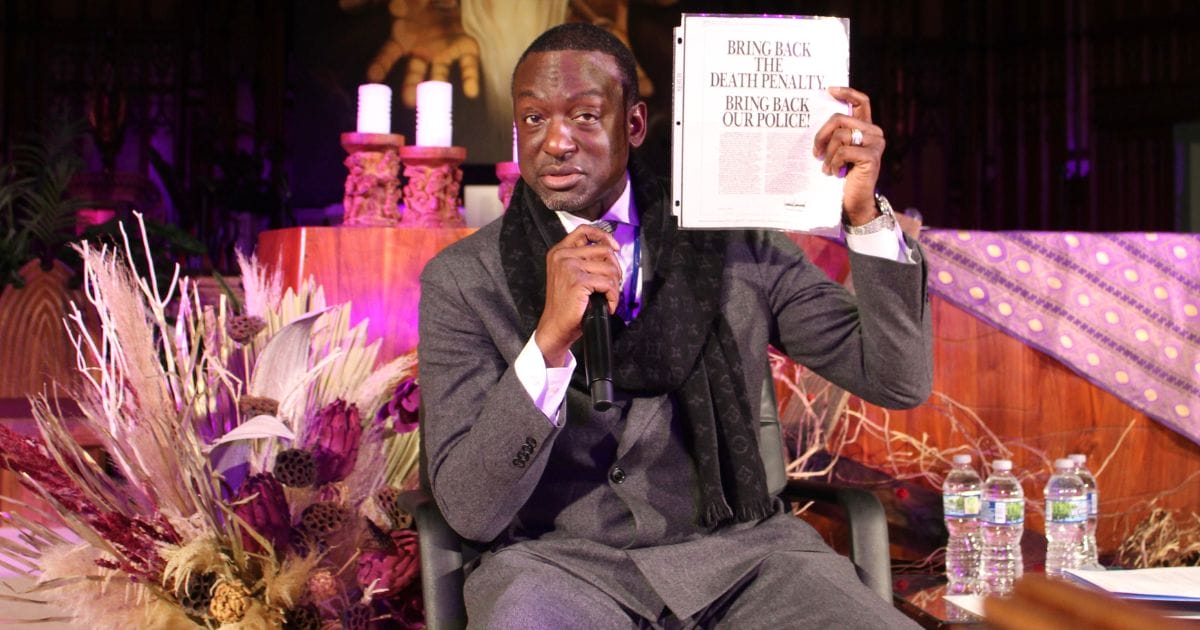Photo caption: YUSEF SALAAM, one of the Central Park Five teens wrongfully convicted of raping and beating a 28-year-old white jogger, said the 6.8 years he spent in prison was a “love story” between God and his people. That made his prison journey softer and easier to bear. (Photos by Chinta Strausberg.)
Although wrongfully convicted of a crime he never committed and served 6.8 years in prison for, allegedly beating and raping a 28-year-old white jogger, Dr. Yusef Salaam, one of the Central Park Five, said on Friday, March 3, his entire incarceration was a “love story.”
In a fireside chat forum, Father Michael Pfleger interviewed the popular motivational speaker and author about a myriad of questions about his life in prison and the effect that incarceration has had on his life.
Salaam, relating his experience to the Chicago Crusader, said when he was arrested, “I couldn’t believe it. I was let down by the system. I thought they were going to kill me. When we were on trial, I first thought the truth would come out and it didn’t. They convicted us anyway.
“When I was in prison, that is when I started seeing more light…six months into my prison days. Things started changing.”
Adding insult to injury, on May 1, 1989, Donald Trump took out four full-page ads in four New York newspapers stating, “Bring back the death penalty. Bring back our police.”
In reflecting on Trump’s ad, Salaam said, “It is such an evil [that] he would take his own money to really affect an outcome of a case in a country that says you’re innocent until proven guilty.
“They looked at the color of our skin and judged us. Even 13 years later, he (Trump) said we had to be guilty of something, almost echoing that the system works, but for the Black and brown bodies, it has not worked. It’s run over us with the spiked wheels,” Salaam said.
Salaam’s nightmare, along with the other four wrongfully accused, Korey Wise, 16; Antron McCray, 15; Raymond Santana, 14; and Kevin Richardson, 14, began on April 19, 1989, when they were arrested and charged with attacking and raping Trisha Meili whose body was found that night in the park badly beaten.
That night, a mob of more than 30 young Black and Hispanic youths were in Central Park reportedly attacking and robbing people. Police ultimately made 14 arrests, including the Central Park Five who were ultimately convicted of assaulting Meili.
Salaam, who was charged with rape and assault of Meili, served six years and eight months in prison, the longest sentence of the five.
The group sued the city of New York for malicious prosecution, discrimination and emotional distress and was awarded a $41 million settlement from NYC for their wrongful imprisonment in 2013. In 2016, they received an additional $3.9 million in monetary compensation from the state.
In an interview with the Chicago Crusader, Salaam said, “The whole of my story even now is a love story between God and his people. As the journey, as I look back, I can see how God had me.
“God allowed me to survive it and even made the journey even softer and sweeter and less harsh than they, the enemy, wanted it to be. They wanted to destroy me, but it didn’t happen. It built me and made me the person I am today.”
Pfleger said he understood Salaam’s fears, having experienced being accused of false allegations several times. The last time, Pfleger said while he knew he would be exonerated of false charges, he worried about bringing back the “bitterness” and anger to his members, friends and family.
Salaam quoted poet Maya Angelou when she said, “You should be angry. You must not be bitter. Bitterness is like cancer. It eats upon the host.” That thought is what Salaam held fast to while incarcerated.
During the fireside chat, both were surprised when two members of the Roscetti Four, Omar Muhammad and Larry Ollins El, presented each with awards of appreciation.
While Salaam spent 6.8 years in prison, the Roscetti Four spent 15 years in prison, also wrongfully convicted of raping, kidnapping and murdering medical student Lori Roscetti in October 1986. They were sentenced to life.
Just as Salaam was freed by DNA testing, after 15 years in prison, so too were the Roscetti Four.






